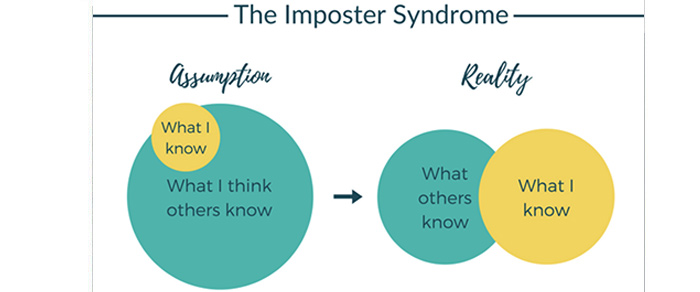
Our Tech Blog Series will be a compilation of topics that are both meaningful and relevant to the Tech Industry (and beyond)! Our first blog covers the topic of Imposter Syndrome, a feeling that many of us experience at some point in our lives. Fellow IQ’er, Sam Cheng, discussed this psychological phenomenon at our annual Professional Tech Conference. We’d like to thank Sam for bringing this topic to the forefront of discussion!
It is common among many employees in the Tech Industry today to feel a level of inadequacy or insecurity when it comes to their work. Whether you are new to a position or have been operating comfortably for a while, many people state that they feel like they are a fraud and are not good enough for the job. This level of fear and anxiety can be crippling and can lead to many harmful coping mechanisms such as:
- Setting an insanely high bar for yourself and accusing yourself of not being able to achieve it.
- Working harder and staying later at the office than the rest of your team in order to measure up.
- Avoiding challenges because it is uncomfortable.
- Feeling shame when you’re faced with a setback.
- Refusing to accept compliments and diminishing obvious evidence of your abilities.
This feeling is often called “Imposter Syndrome”. It is the fear that at any moment, someone will realize that you don’t know everything that they thought you knew. It is also the inability to internalize success. No matter how much you accomplish or succeed, you are unable to have that reality reflect what you feel about yourself.
Overcoming imposter syndrome can be a long and arduous journey. Here are some tips and advice that we use to cope:
1. Be honest
We need to start by being honest with ourselves and to others about our fears. We want our workplaces to establish a culture where people are psychologically safe to share about deep-seated shame and vulnerabilities and to not receive backlash or ridicule for doing so. It is only by admitting our struggles can we begin the process of dealing with them. As we practice honesty, we’ll find that it is remarkably freeing to do so.
2. Find someone to listen
It is immensely helpful to have a few close people in your life with whom you can share your struggles and thoughts. Here at IQ, it can be your engagement leader, team member, manager, or fellow colleague. It can also be a friend, spouse, or mentor. The goal is that they would be able to talk you off the brink and to offer some much-needed perspective into times when you are spiraling into discouragement.
3. Control your thoughts
Talking about imposter syndrome openly is a start but it cannot end there. It may sound cliche but the battle is in our minds. The difference between those who struggle heavily with imposter syndrome and those who don’t is that those who don’t think different thoughts. When negative thoughts come in, we need to put a pause on it. Take control of your mind and do not let it control you. The more I entertain negative thoughts, the more I wallow in self-pity and despair. I need to stop those harmful and false thoughts dead in their tracks. No one likes to fail. No one likes to make mistakes. No one likes to not know an answer. However, to stop feeling like an imposter, we need to stop thinking like an imposter.
4. Let yourself off the hook
Take a deep breath and let yourself off the hook once in a while. With the vast tech landscape before us, it is impossible to be an expert in everything. It is okay to say “I don’t know.” It is okay to make mistakes. It is not the end of the world. No one will laugh at you. The key is to admit that you don’t know, be humble, and be willing to learn and grow.
5. Celebrate victories
It’s okay to celebrate the times where you were brave enough to ask a question or when you didn’t deflect a compliment. Find your support group and celebrate your victories with them. It may seem silly but acknowledging and tracking milestones when you exhibit personal growth is very helpful for building your confidence towards overcoming imposter syndrome.
In conclusion, everyone may feel Imposter Syndrome, at times, or different versions of it, but it is manageable if you take the steps to figure out what can be done to ease and eliminate this feeling.



